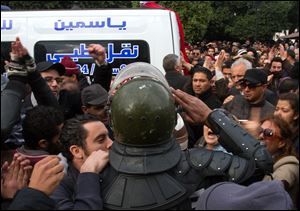
Tunisian opposition leader shot provoking anti-government riots across the country
2/6/2013
A riot police officer salutes the ambulance carrying the body of Chokri Belaid after he was shot to death in today Tunis.
TUNIS, Tunisia — Shaken by the assassination of a prominent leftist opposition leader that unleashed massive protests, Tunisia's prime minister announced today that he would form a new government of technocrats to guide the country to elections "as soon as possible."
The decision by Prime Minister Hamadi Jebali was a clear concession to the opposition, which has demanded a reshuffle of the Islamist-dominated government. It aolso came hours after the first assassination of a political leader in post-revolutionary Tunisia — a killing that marked an escalation in political violence, sparked claims of government negligence — if not outright complicity — and bolstered fears that Tunisia's transition to democracy will be far more chaotic than originally hoped.
"This is a sad day that shook the country regardless of our differences," Jebali said in an address to the nation, whose capital city still smelled of the tear gas lobbed at demonstrators angry over the killing of 48-year-old Chokri Belaid.
"We are at a crossroads and we will learn from it to make a peaceful Tunisia, secure and pluralist, where we may differ but not kill each other."
The ruling coalition, led by Jebali's moderate Islamist Ennahda party, had been in stalled negotiations with opposition parties to expand the coalition and redistribute ministerial portfolios in an effort to calm the country's fractious politics. Elections had been expected for the summer but an exact date depended on the elected assembly finishing the new constitution.
Jebali said the new ministers in the technocratic government "would not belong to any party and its task would be limited to organizing elections as soon as possible with a neutral administration." It was not immediately clear if he intended to lead the new government, although his statement did not suggest otherwise.
Tunisians overthrew their long-ruling dictator Zine El Abidine Ben Ali in January 2011, kicking off a wave of pro-democracy uprising across the Middle East and North Africa that have met with varying degrees of success.
With its relatively small, largely educated population of 10 million, Tunisia has been widely expected to have the best chance of successfully transitioning to democracy. Its first post-dictatorship election brought to power the moderate Islamists of Ennahda in coalition with two secular parties.
But also on the rise have been ultraconservative Muslims known as Salafis, who have often resorted to violence in their push for strict Islamic law. In addition, so-called Leagues for the Protection of the Revolution have sprung up, with the stated intent of pursuing members of the old regime.
In practice, opposition leaders such as Belaid said the leagues became Ennahda-backed goon squads that attacked opposition rallies. Last weekend, saw a string of attacks against such meetings, including a rally held by Belaid's Popular Front in northern Tunisia.
Belaid, a lawyer, was shot as he left his house in Tunis this morning.
The scenes in Tunis afterward were reminiscent of the final days of Ben Ali as protesters surged down the tree-lined Bourguiba Avenue toward the Interior Ministry chanting "the people want the fall of the regime" and were met with volleys of tear gas and riot police.
At one point, the ambulance containing Belaid's body, surrounded by angry mourners, headed toward the ministry before it was driven off by tear gas.
By late afternoon, the center of the city was largely deserted and littered with stones, guarded by police armored vehicles and patrolled by a tank from the national guard. Knots of riot police chased protesters through the elegant downtown streets.
The night before his death, Belaid called for the dissolution of the leagues.
"There are groups inside Ennahda inciting violence," Belaid told the Nessma TV channel. "Rachid Ghannouchi considers the leagues to be the conscience of the nation, so the defense of the authors of violence is clear. All those who oppose Ennahda become the targets of violence."
Ennahda, however, has denied supporting any violence and promised an investigation into the assassination.
Ennahda leader Rachid Ghannouchi told The Associated Press that Belaid's slaying was an "ignoble crime" and urged authorities to bring the perpetrators to justice. He also offered his condolences to Belaid's family and followers and called for a day of mourning.